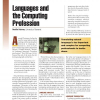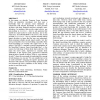171 search results - page 13 / 35 » Logical omniscience and common knowledge: WHAT do we know an... |
PSYCHNOLOGY
2006
13 years 7 months ago
2006
Ever more frequently, social and particularly group interactions, involve mediated communication. Yet we know very little about the factors determining the effectiveness of the in...
ESOP
2005
Springer
14 years 1 months ago
2005
Springer
Are computing systems trustworthy? To answer this, we need to know three things: what the systems are supposed to do, what they are not supposed to do, and what they actually do. A...
BIRTHDAY
2005
Springer
14 years 1 months ago
2005
Springer
Abstract. The vision of a Semantic Web has recently drawn considerable attention, both from academia and industry. Description logics are often named as one of the tools that can s...
COMPUTER
2004
13 years 7 months ago
2004
highly abstracted. The Chinese writing system uses logographs--conventional representations of words or morphemes. Characters of the most common kind have two parts, one suggesting...
CHI
2004
ACM
14 years 8 months ago
2004
ACM
In this paper, we describe Common Sense Investing (CSI), an interactive investment tool that uses a knowledge base of common sense statements in conjunction with domain knowledge ...


